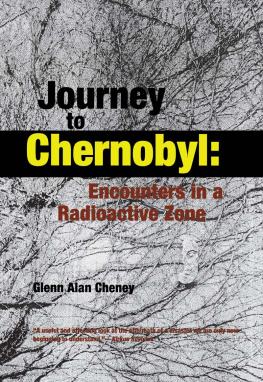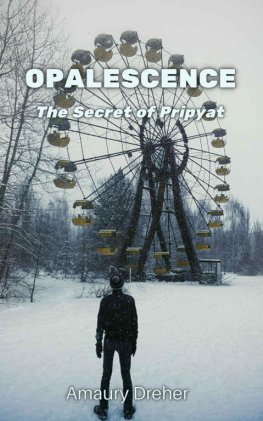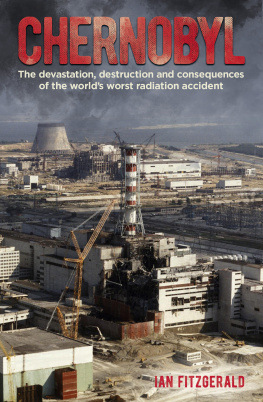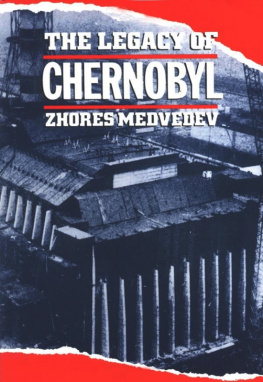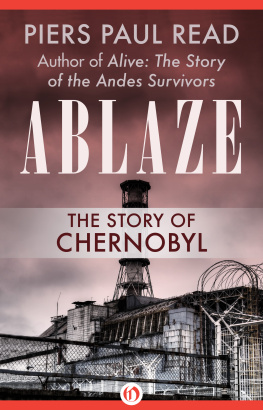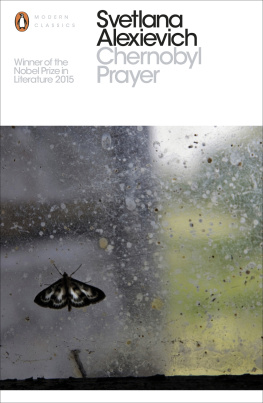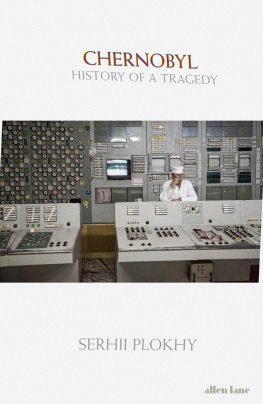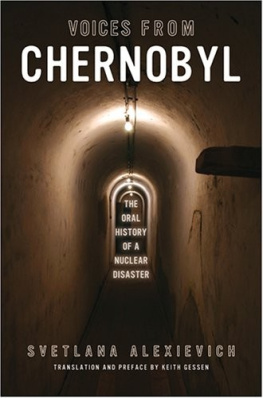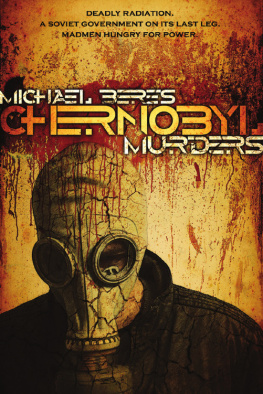
A LSO BY G LENN A LAN C HENEY
Nuclear Proliferation: Problems and Promises (1996)
Nuclear Testing: The Atomic War on American Soil (1996)
El Salvador, Country in Crisis (1990)
The Mariana Scouts in Amazonia (1987)
The Mariana Scouts in the Valley of Spirits (1986)
Responsibility (1985)
Revolution in Central America (1985)
Mineral Resources (1984)
The Amazon (1984)
Mohandas Gandhi (1983)
Television in American Society (1983)

Published in 1995 by
Academy Chicago Publishers
363 West Erie Street
Chicago, Illinois 60610
Copyright 1995 Glenn Alan Cheney
No part of this book may be reproduced in any form without express written permission of the publisher.
Library of Congress Cataloging-in-Publication Data
Cheney, Glenn Alan.
Journey to Chernobyl: encounters in a radioactive zone/Glenn Alan Cheney.
p. cm.
ISBN 0-89733-418-3
1. Chernobyl Nuclear Accident, Chornobyl, Ukraine, 1986-Social aspects. 2. Radiation victims-Ukraine. I. Title.
HV623 1986.U38C44 1995 95-32629
363.17990947714dc20 CIP
TABLE OF CONTENTS
CHAPTER ONE
Boots
December 3, 1991
The Aeroflot crew argues at the hatch with mannerisms and emphases possible only in a foreign language. They have a problem with paperwork. The plane sits dockside for an hour. Half a dozen gringos and I, all UN Experts bound for St. Petersburg to shoot the breeze on Free Economic Zones, sit elbow-to-elbow in seven seats until we figure out that the rest of Beezneez Class is all but empty. Were it.
The stewardesses are just what youd expect in a joke about a Russian airline: hulking, crudely made up babushkas of the future. The plane takes off with a ferocious roar, shuddering with effort as it rises into the night and tilts to the east. The cabin fills with the scream of heavy wind and a persistent whine like high-speed gears. Im scared.
Three hours later, we land. Ireland already? The fellow next to me, an Indian chap named Rao, says, Its not as far as youd think. Maybe so. But it sure doesnt look like Ireland out there. Sidewinders of snow writhe across the ice-patched runway. Its too dark to read the letters on the side of the terminal. Rao gives me a look that either confirms or doubts that it snows in Ireland.
As we clomp down the aluminum stairs into the baggage compartment, the stewardess hands us each a chit for a Free Beverage. Then we clomp down to the icy runway and the frostbit night. Its a crisp, quick hustle to the terminal building. The snow crunches under our shoes. Everybody but me is in street shoes. Im glad my hiking boots didnt fit in my suitcases. We all wish wed worn overcoats. Still walking, we look back to see what an IL-86 looks like. Despite the dramatic runway spotlights and the opaque black of the sky behind, its your basic jet: huge, squat, stubby, serious, with four basic cast-iron engines on the wings, no frills attached. It was obviously not built with miles per gallon in mind. Thats why were still in North America and walking across a runway in the middle of the night.
It turns out were in Gander, Newfoundland. The free beverage is a can of Pepsi. Everybody trades in his chits, then heads for the Duty Free shop or hangs around the lobby joking about Russia. The terminal is a cross between a Quonset hut and a woodsy lodge. On one vast wall, clocks show the hours in all the Canadian time zones. Everywhere from Vancouver to Quebec its half-past the hour. In Gander its 10:15.
Back on the plane, we knock down some vodka with a midnight breakfast. It beats the mineral water, which tastes of sewage and seawater. There is also a cloudy brown wine which tastes sweet and homemade. Lunch: pale, mushy peas from a can, slices of old, old beets, crunchy noodles, obvious leftovers. For dessert, lacerated apples dented with bruises, served by a woman who looks as if she lives on whatever we dont eat. She isnt a regular stewardess. I think she just comes up out of the baggage compartment to serve us apples from a tray. Its her job.
Rao warns me about the bathroom. I havent been in there yet because I dont feel like putting my boots on. I figure I can hold it till Ireland.

The Pribaltiskaya Hotel is a special economic zone in which only hard currency is good. With it you can buy anything from Russian women to Miller Lite. The hookers, strictly nocturnal, are well behaved, even shy. They sit in the bars in tight jeans or short skirts, avoiding eye contact. As employees of the Russian mafia, theyre let in on a bribe and allowed to stay on good behavior. Somebody told me they charge or maybe it was probably charge a hundred dollars for the night. A lot of that is baksheesh that gets distributed to everyone from the doorman, I assume, to the hotel manager. Just as in the land of the free and the home of the brave, its the middle-pimp who makes the most. Somebody else told me that out there in the real world if you can call Russia real you can get a nice one for five smackeroos, about one-third what a university professor makes in a month.
The food in the hotel restaurant isnt bad, but it has a rustled-up look to it, like maybe its all that was available. A lot of it came out of cans. One doesnt serve Spam for breakfast unless one has to, not in a place that charges as much as a prostitute who speaks a little English. Im sure theres no special name for the soups of gristle and fat, tasty though they may be. One feels a bit guilty for not finishing whats on ones plate or for helping oneself to an extra half-glass of grapefruit juice when a waiter isnt looking. In fact one feels guilty eating when the waiter is looking. Dont they feed these guys? Do they get the leftovers? Or is that whats in the soup?
We UN Experts eat at large circular tables set for eight. When I tell the other Experts Im going to Kiev to look into Chernobyl, they crack the same did-you-bring-your-lead-lined-jock jokes I had heard several hundred times before I left home. When they finish with that, they ask more soberly what Ive done to protect myself and if I fully understand what Im getting into. I confess Ive done nothing and know little. I was living in Brazil when Chernobyl blew up on April 26, 1986. The newspapers there reported the fact briefly, then got back to the comings and goings of the Pope, Princess Diana, Gorbachev, Boy George and whoever else was glittering at the time.
So I dont know what to expect. It wouldnt surprise me to find hospitals full of mutated babies, overflowing cancer wards, forests that glow in the dark, death all around. A Ukrainian I happened to meet in New York heard from his mother in Kiev that all the streets are littered with the flowers that are traditionally tossed at funeral processions. The funerals are constant, she said.
I have two contradictory suspicions. From anyone who claims to know something about the results of Chernobyl, Ive heard that the situation is horrifically worse than anyone knows. From the press, Ive heard nothing in years. Is it possible that massive slaughter has gone unnoticed or fallen by historys wayside?
By chance I meet a Russian in the hotel who was director of security at Chernobyl. To prove it he shows me his photo identificationwith some difficulty, because hes holding a short leash with a Great Dane on the other end, a very cool dog, calm and thoughtful. His master tells me the dog saved seventy-four people after the earthquake in Georgia. I pat the dogs head and say, Good dog! Then the director says it is possible for me to take a tour of the Chernobyl plant. Despite the many warnings Ive heard, this sounds like a great idea. But then he says Ill have to pay a little money.
Next page
